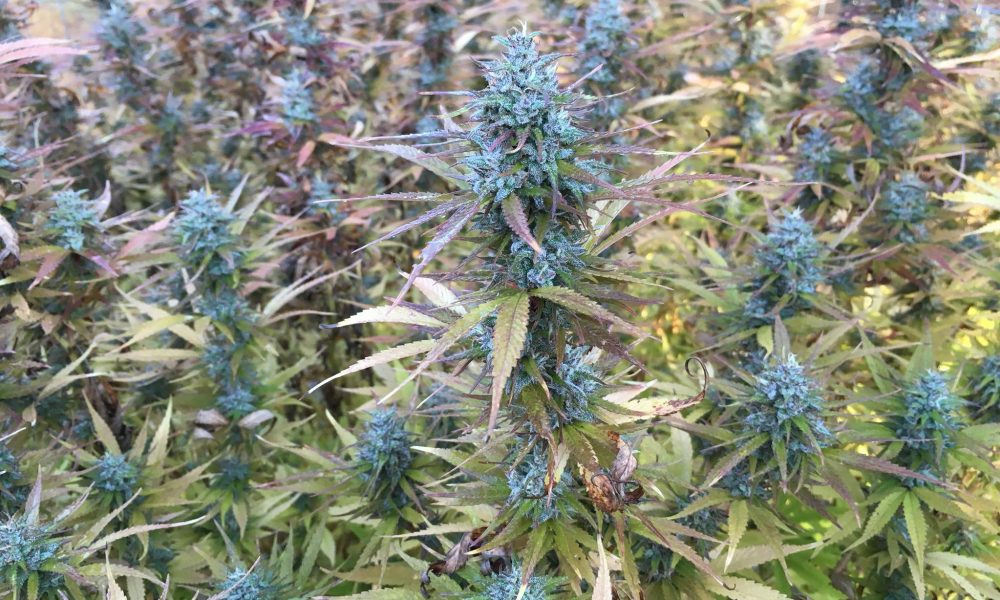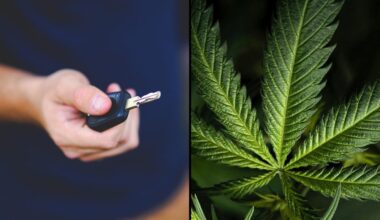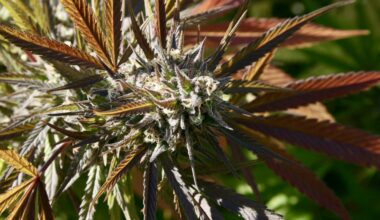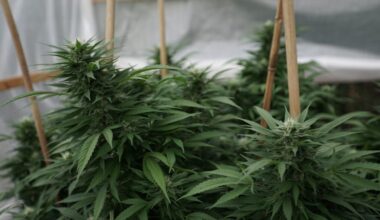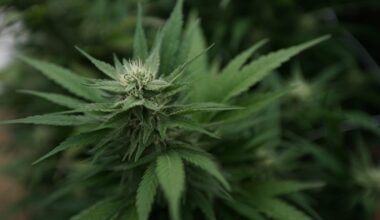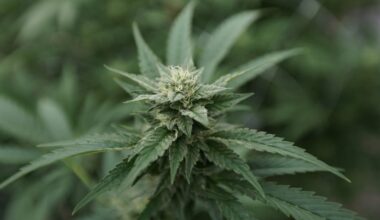The mayor of New York City acknowledges that his plan to put marijuana greenhouses on to rooftops of public housing buildings may hit a snag with the federal government, and so the administration intends to seek a “waiver” to avoid a conflict.
Mayor Eric Adams (D) first floated the idea of using NYC Housing Authority (NYCHA) facilities to grow cannabis as the state prepares to implement adult-use legalization at a conference event last weekend.
He was asked about the proposal on Tuesday at a press briefing on climate-related issues, and he addressed the possible funding repercussions of authorizing cannabis gardens at buildings that receive substantial financing from the federal government, which continues to strictly prohibit marijuana.
“We have to get over the federal hurdle because, right now, the federal government does not recognize the legalization in the state,” Adams said. “I believe there’s a great opportunity for cannabis to be grown on NYCHA rooftops, with an employment aspect of it and using the medical cannabis aspect of it.”
That said, “there’s many layers to getting it done,” he said. “We’re going to sit down with the federal government and federal agencies, [and] see if it’s a possibility to get a waiver [and] how we can get it done.”
“We have to think differently about employment opportunities, and using our rooftops better. And so we’re willing to try everything that’s possible to get those goals in mind and aligned,” he added. “If we can use it—if the federal government cooperates with us and it allows us to use it—we’re straight ahead to make it happen.”
While the feds have generally taken a hands-off approach to state and local marijuana policies—and President Joe Biden has pledged not to interfere in those reforms—it could be a different story if New York City started to use federally backed public housing property as a place to produce a Schedule I drug like marijuana without its consent.
According to NYCHA, the city agency “generally receives about $1 billion in operating subsidies annually from the federal government.” Putting marijuana plants on the tops of those buildings while cannabis remains federally prohibited could potentially jeopardize those dollars.
The U.S. Department of Housing and Urban Development (HUD) stands out as an especially anti-cannabis agency, too.
For example, the department said last year that it is required to continue denying federally assisted housing to people who use marijuana, even if they’re acting in compliance with state law.
Rep. Eleanor Holmes Norton (D-DC) sent a letter to HUD Sec. Marcia Fudge last year imploring the department to use executive discretion and not punish people over cannabis in legal states. But HUD’s response was clear: It said that “consistent with federal law, HUD prohibits the admission of users of marijuana to HUD assisted housing, including those who use medical marijuana.”
A former Trump-appointed HUD official with the department’s regional official overseeing New York and New Jersey did say in 2018 that she was working to resolve conflicting federal and state marijuana laws as it applies to residency in federally-subsidized housing—but nothing apparently came from that.
While HUD might not be willing to exercise discretion when it comes to federal marijuana prohibition, it should be noted that the Justice Department has so far declined to take enforcement action against New York City after it authorized the launch of the nation’s first safe consumption sites where people can use currently illicit drugs in a medically supervised environment and receive treatment resources.
That’s in spite of the fact that DOJ under the Trump administration filed a lawsuit blocking a Philadelphia non-profit from opening such a facility based on an interpretation of federal statute prohibiting such services. That case is ongoing.
In any case, Adams’s interest in exploring putting cannabis greenhouses on NYCHA rooftops comes as regulators and lawmakers continue to work toward implementing the state’s adult-use market.
Most recently, the legislature sent a budget proposal to the governor’s desk over the weekend that includes provisions to let marijuana businesses take state tax deductions that are available to other industries despite an ongoing federal ban on cannabis.
—
Marijuana Moment is already tracking more than 1,000 cannabis, psychedelics and drug policy bills in state legislatures and Congress this year. Patreon supporters pledging at least $25/month get access to our interactive maps, charts and hearing calendar so they don’t miss any developments.![]()
Learn more about our marijuana bill tracker and become a supporter on Patreon to get access.
—
Regulators separately advanced a rule last month to make it so people with prior marijuana convictions, or whose family members have been harmed by criminalization, will get the first round of adult-use marijuana retailer licenses—ahead of existing medical cannabis businesses. A recent poll found that most New Yorkers voters are against that proposal.
The state has also taken separate steps to get the industry in a position to have products available by creating provisional marijuana cultivator and processor licenses for existing hemp businesses that take certain steps to promote equity in the emerging industry. Gov. Kathy Hochul (D) signed that legislation in February.
Last week, New York regulators approved 52 such conditional marijuana cultivation licenses as one of the first steps toward ensuring an adequate supply of cannabis when the state’s adult-use market launches.
As it stands, adults 21 and older can possess and publicly consume cannabis, as well as gift marijuana to other adults as long as they aren’t being compensated. But regulators are still finalizing licensing rules, and there are currently no retailers that are authorized to sell cannabis for adult use in the state.
Hochul has repeatedly emphasized her interest in efficiently implementing the legalization law.
The governor released a State of the State book in January that called for the creation of a $200 million public-private fund to specifically help promote social equity in the state’s burgeoning marijuana market. That funding, called the “New York Social Equity Cannabis Investment Program,” is the last component of the Seeding Opportunity Initiative.
Hochul said that while cannabis business licenses have yet to be approved since legalization was signed into law last year, the market stands to generate billions of dollars, and it’s important to “create opportunities for all New Yorkers, particularly those from historically marginalized communities.”
That proposal was also cited in the governor’s executive budget, which was released in January. The budget also estimated that New York stands to generate more than $1.25 billion in marijuana tax revenue over the next six years.
Enacting legislation that expedites licensing could help the state reduce the number of businesses that are effectively using the legal “gifting” provision of the state’s marijuana law to give away cannabis for “free” if a non-marijuana-related purchase is made.
New York regulators recently issued warnings to more than two dozen businesses that they allege are either illegally selling marijuana without a license or exploiting the “gifting” component.
Here are some other ways that New York lawmakers and regulators are working to build upon the legalization law as the state prepares to implement retail sales:
A New York senator recently filed a bill that would allow regulators to disclose certain information about cannabis licensees to financial institutions—a step meant to provide banks with additional transparency that could encourage marijuana banking.
In February, another state senator filed a bill that would promote recycling in the marijuana industry once retail sales officially launch.
Sen. Michelle Hinchey (D) is also sponsoring that legislation, which would require cannabis shops to apply a $1 deposit for any marijuana products sold in single-use plastic containers and also reimburse consumers for that fee if they return the container.
The senator is also behind a separate bill filed last year that would prioritize hemp-based packaging over synthetic plastics for marijuana products.
The recycling bill is identical to an Assembly version filed by Assemblywoman Patricia Fahy (D) last year.
The state Department of Labor separately announced in recent guidance that New York employers are no longer allowed to drug test most workers for marijuana.
Meanwhile, a New York lawmaker introduced a bill in June that would require the state to establish an institute to research the therapeutic potential of psychedelics.
Another state legislator filed legislation in December to legalize psilocybin mushrooms for medical purposes and establish facilities where the psychedelic could be grown and administered to patients.
Meanwhile, as New York prepares the launch of its adult-use marijuana market, OCM announced a significant expansion of the existing medical cannabis program.
The Cannabis Control Board (CCB) approved revised regulations last week to allow medical marijuana patients to grow their own plants for personal use following a public comment period on initial rules that were proposed last year.
Doctors are now also able to issue medical marijuana recommendations to people for any condition that they feel could be treated by cannabis, rather than rely on a list of specific eligible maladies.
Florida Officials Invite Students Grades 4-12 To Invent New Uses For Hemp As Part Of Essay Contest
Photo courtesy of Nicholas C. Morton.
Medical Disclaimer:
The information provided in these blog posts is intended for general informational and educational purposes only. It is not a substitute for professional medical advice, diagnosis, or treatment. Always seek the advice of your physician or other qualified healthcare provider with any questions you may have regarding a medical condition. The use of any information provided in these blog posts is solely at your own risk. The authors and the website do not recommend or endorse any specific products, treatments, or procedures mentioned. Reliance on any information in these blog posts is solely at your own discretion.
